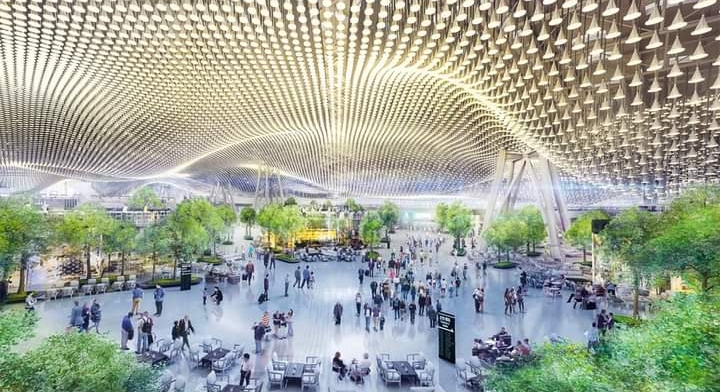Seattle-based design firm Teague once contributed to the design of Microsoft’s Xbox and Boeing’s 787 Dreamliner. The company is now working on how to make the passenger experience more comfortable on future flights.
In doing so, the company has come up with a new airline called ‘Poppi’ – which is revolutionary, innovative and very attractive.
But it is not a real airline. Poppy is still just a concept. Poppy is an example of a realistic vision of what the future of air travel might look like. However, the concept is so good that many hope that the ideas will become reality very soon. Let’s give some indication of how Poppy differs from all other real airlines.
Poppy will not have any large carry-on bags. Instead, everyone’s luggage will have a radio-frequency identification (RFID) tag, which will tell them exactly where their bag is. This avoids the familiar rush of stuffing bags into overhead bins in the cabin, and results in a much shorter exit from the plane.
How will this method work? Just like that—every bag would have a little tag, and the plane would have sensors. Once the bag is checked-in, its tag will be read and you will be updated about the location of the bag. You can see right on the phone whether the bag has boarded the plane, where it is stored, and even exactly when it will arrive on the conveyor belt after disembarking!
This small change can make a big difference. No more jostling, no more waiting to stuff passengers’ bags into overhead bins. This is just a small example of Poppy’s innovative designs. Tigu is working on many such things.
Those who regularly travel by air for business need to keep their bags close. Poppy has special benefits for them! They will get a seating arrangement where the bag becomes a part of the seating area.
Poppy is also offering several new classes. This seat can be part of the “Promotional Class” to avoid the common annoyance of sitting in the middle seat! Special gifts, bonuses or other benefits may be offered to ease the discomfort of sitting here. Some passengers can opt for “Cinema Class” for a little more, which offers a different experience like watching special sponsored content.
Apart from Tigu, many companies are actually experimenting to bring new innovations to the aviation industry. If any of these become popular, they will revolutionize our air travel experience.
1. Disturbance reduction technology
Multinational company SITA provides information technology services to the aviation industry. The company provides its services to approximately 400 members and 2,500 customers worldwide.
They conducted an experiment with wearable electronic devices, such as smartwatches and glasses, on agents at the gate. These devices had cameras and augmented reality systems installed. In the future, with these devices, it will be possible to scan boarding passes and international passports in less than a second just by looking at them.
These gadgets can also be very useful for airline employees. With the introduction of devices, customers no longer need to use a computer at a central desk to access customer information.
Dutch airline KLM has a program called ‘Happy Flow’, where passengers are identified using facial recognition software. As a result, bag drop off, immigration check and boarding operations can be completed in a very fast time.
In this way, the use of technology will make the work of passengers much easier at different places in the airport, they will be able to reach their respective seats in a faster time.
2. Different workspaces and smart seats
The European company Airbus has planned a new type of cabin. In their plan, the interior of the plane was not filled with too many seats. They have not even divided the plane into first class and economy class. Instead, different activities have been arranged for all passengers.
The plane has space for meetings, and there are also places to hang out. If one wants to play golf or something else with virtual reality ie VR there is also that system. Again there is a place called revitalizing zone, which will refresh the passengers.
Passengers can sit and relax on the ‘Smart Seat’ here. Where there will be various massages to aroma therapy services to feel refreshed.
3. Manufacture of customized aircraft
Many airlines are utilizing the interior space of their Airbus aircraft to suit customer needs. For passengers, these aircraft have sleeping cabins, showers, luxury bars and meeting spaces.
These services are available now. Many companies want customers to be able to customize seats on Airbus aircraft to increase their satisfaction in the future.
4. Constituency election
Facebook, Twitter and other online social networks have become an important part of citizens’ lives. Marketing strategy company WNS notes that airlines are looking to make full use of this ‘connectedness’.
For example, KLM Airlines is now experimenting with a “meet and sit” program.
The program allows passengers to share profiles with other flight companions on social media. You can choose your preferred seat partner based on mutual consent. Passengers can choose someone with the same profession or similar mindset. Or you can sit next to someone on the plane with whom you can spend the entire flight chatting. If the program is successful, it is hoped that other airlines will adopt it in the future.
5. Membership package
For those who travel regularly for business, online travel service startup Onego has come up with an offer.
It’s a subscription system like Netflix or Prime, where customers can fly as many flights as they want on all major US airlines for a fixed monthly fee.
6. Use of alternative fuels
If airlines could reduce the cost of jet fuel, air travel would be much cheaper. At the same time, greenhouse gas emissions could also be reduced.
The Boeing Company, with funding from NASA, is working on the Sugar Volt project, which uses a hybrid electric engine system.
Similar to this are hybrid automobiles powered by a combination of gasoline and electronic batteries. Another research project of the aircraft manufacturing company is Sugar Freeze. This project uses liquefied natural gas for propulsion. It is also an environmentally friendly fuel.
Some of the ideas mentioned here are more realistic than others, some less so. But whatever it is, there are going to be some big changes in the aviation industry in the future.
Some companies want to eliminate carry-on bags. One of Poppy’s suggestions is to eliminate overhead carriers entirely, so that it can become an effective way to reduce aviation costs.
Many in the industry believe that when customers see that air travel is becoming more comfortable, they will begin to adopt many new things. According to them, Uber and Airbnb have been able to dramatically change travel habits using similar methods. So they can too. Because they found, customers are much more adaptable. So their main goal is to provide better customer experience.
#aircraft #innovation #service



